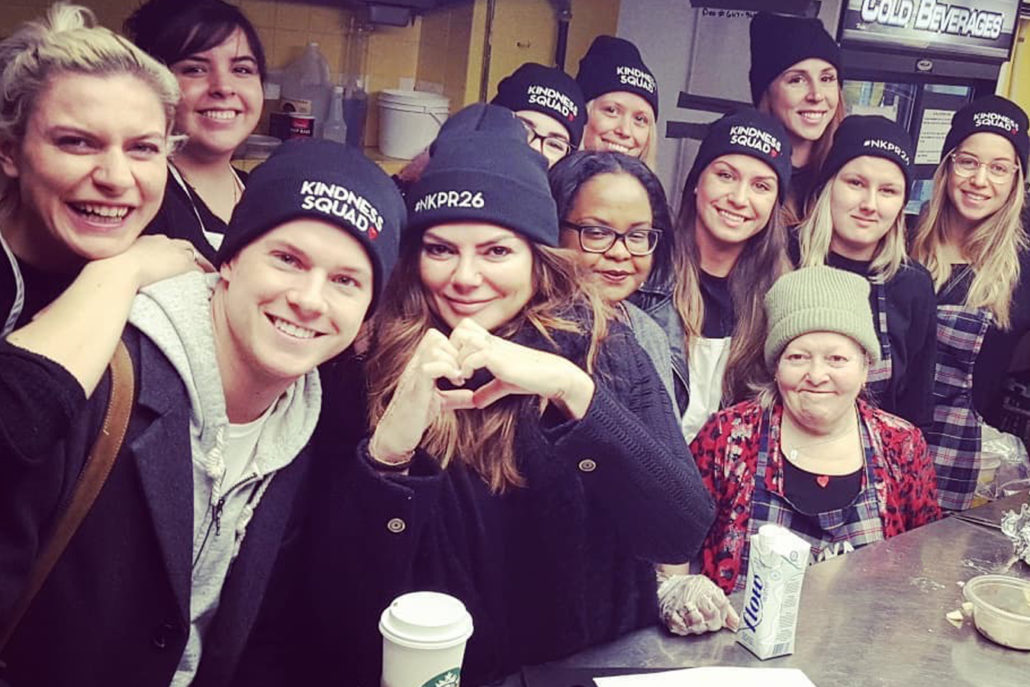
There are plenty of benefits, but if your boss still needs convincing, here’s what to do
Stop us if this sounds familiar: during festive times of year, boxes of chocolates multiply on the office’s communal freebie table, while bottles of pricey wine from clients land on bosses’ desks. The place is humming an endless flow of packages coming in, parcels going out.
That’s where Natasha Koifman found herself three years ago when she noticed her Toronto and New York-based public relations firm, NKPR, was in the thick of gift-giving-and-receiving season. But something wasn’t quite right. “Instead of showering clients with bits and bobs they didn’t necessarily need, why not do something besides opening our pocketbook?” Koifman thought. What she wanted was a way to roll up her sleeves, get her hands dirty, “give back in a meaningful way that supports the community where we live and work,” she says.
And so, the NKPR 26 Hours of Kindness initiative was born. “In lieu of giving traditional gifts, we wanted to give the gift of kindness by donating our time, resources and money to people and programs across the city who were truly in need,” Koifman says. “From random acts of kindness to community dinner programs, the NKPR team, our client partners and friends of the agency came together for 26 hours of giving back.”
The reasons behind Koifman’s program resonate with Sari Friedman, a HR consultant and career coach in Toronto. “An increasing number of employers and organizations are supporting important causes within the context of the workplace,” she says. “While the idea of spending business hours volunteering may seem like a ‘big ask’, there are so many reasons why an organization should support this, and why employees should feel great about bringing these requests forward.”
There’s also a growing expectation from the public that companies have a responsibility to improve the world, says Elizabeth Dove, the director of corporate citizenship for Toronto-based Volunteer Canada. Employees believe it’s the employers’ responsibility to support their teams in charitable acts. “According to research we did in 2016, 68 percent of Canadians, given the choice between two jobs, would choose the one with the stronger volunteer culture,” she says.
“There’s even an argument to be made for volunteerism’s money-saving potential: improves culture and loyalty, all of which is proven to improve productivity,” Dove explains. And even if it doesn’t make a huge difference to the bottom line, corporate citizenship does reign supreme in the workplace. “It offers connection with the company, connection with the community, the development of skills and well-being,” Dove says.
But not all managers are quick to buy into the idea of their teams taking a workday to shower their communities with good deeds. Here’s how to pitch the higher-ups about starting your own volunteer initiative and boosting your company’s altruism. (Spoiler: It’s pretty much win-win for everyone.)

Start with one day
“Though these can be limiting in terms of level of employee engagement and impact, starting slowly can introduce colleagues to causes, and from there they can choose the organization or charity to which they’d like to make a regular commitment,” Dove says. “The opportunity should be framed in that way for employees, including giving context for activities for example, it’s important to paint the trim at this shelter to improve the self-worth of those who live here,” she says. “End activities with a reflection on what has been learned, as well as and what next steps might those who are there take on their journey as engaged citizens.”
Choose the right fit
To find the right opportunity for your workplace, consider the company’s history of giving back and what community relationships you might want to build. “Where does your company work and which populations does it impact? What are your passions? What best aligns with company/employee core competencies?” asks Dove. Koifman recommends having teams weigh in on the charity they’ll be supporting to boost their interest. “Each year I ask the NKPR team what causes are important to them before planning 26 Hours of Kindness because I really want them to be invested in giving back,” she says.
Be smart about the timing of your pitch
Research time, location and requirements. “Make sure your endeavour doesn’t conflict with a particularly busy time of year for the company. For example, if you’re a retail organization, you likely won’t want to do this in December,” Dove says.
Pitch team and morale building
Yes, you’ve got a great platform to make a difference in the life of people who really need it, but let’s be honest there is a bit of self-interest on the part of the organization. “Beyond being an opportunity to support the community, it has also become a special team building moment for NKPR,” says Koifman. “The team looks forward to this initiative every year because it is an opportunity for them to step outside of their day-to-day work and learn about meaningful causes. It is also a way for us to bond as a team and with our clients, who regularly come out to participate and donate essentials.”
Friedman says employees will feel good about knowing their employer value a cause, so much that they’re willing to spend a day of all employees’ salaries to support it. If it’s a team effort, be prepared for a great bonding exercise, which will strengthen their relationships after the event. “They’ll have had the opportunity to team build and share new experiences together.”
Newest posts
July 12, 2025
Helping youth thrive this summer
This week, we’re talking about youth employment programs, strengthening community hubs, supporting black youth and inclusive employment.
In this Q&A, 10 leaders of equity-deserving agencies share how United Way’s stable, multi-year Anchor Agency funding is helping them serve their communities, build capacity and drive lasting change across the GTA.
June 14, 2025
Investing $2M to protect what matters most
This week, we’re talking about our new grants to protect community spaces, the importance of stable housing, entrepreneurs in the Greater Golden Mile and more.